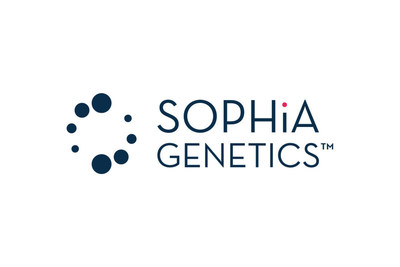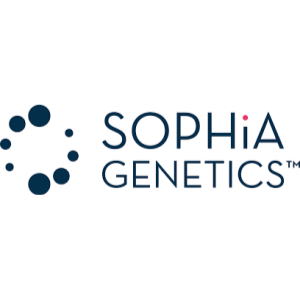SOPHiA GENETICS Presents Ground-Breaking Multimodal Research on AI-Driven Patient Stratification at ESMO 2024
SOPHiA GENETICS (Nasdaq: SOPH) will present groundbreaking research at ESMO 2024, showcasing AI-driven patient stratification for non-small cell lung cancer (NSCLC) treatment. The study, conducted with AstraZeneca, analyzed the POSEIDON Phase 3 clinical trial using multimodal machine learning to identify NSCLC patient subgroups most likely to benefit from combination immunotherapy.
The research revealed signatures associated with higher overall survival benefit from adding tremelimumab to durvalumab and chemotherapy in first-line treatment of metastatic NSCLC. Key genetic factors included EGFR wild-type, FGFR3 wild-type, CDKN2A wild-type, KRAS mutation, and STK11 mutation. This approach could significantly impact NSCLC treatment by enabling more personalized care strategies.
SOPHiA GENETICS (Nasdaq: SOPH) presenterà ricerche innovative all'ESMO 2024, mostrando stratificazione dei pazienti guidata dall'IA per il trattamento del carcinoma polmonare non a piccole cellule (NSCLC). Lo studio, condotto in collaborazione con AstraZeneca, ha analizzato il trial clinico di fase 3 POSEIDON utilizzando apprendimento automatico multimodale per identificare i sottogruppi di pazienti NSCLC più suscettibili a beneficiare dalla combinazione di immunoterapia.
La ricerca ha rivelato firme associate a un maggiore beneficio in termini di sopravvivenza generale dall'aggiunta di tremelimumab a durvalumab e chemioterapia nel trattamento di prima linea del NSCLC metastatico. I principali fattori genetici identificati includevano EGFR wild-type, FGFR3 wild-type, CDKN2A wild-type, mutazione di KRAS e mutazione di STK11. Questo approccio potrebbe avere un impatto significativo sul trattamento del NSCLC, consentendo strategie di cura più personalizzate.
SOPHiA GENETICS (Nasdaq: SOPH) presentará investigaciones innovadoras en ESMO 2024, mostrando estratificación de pacientes impulsada por IA para el tratamiento del cáncer de pulmón no microcítico (NSCLC). El estudio, realizado junto a AstraZeneca, analizó el ensayo clínico de fase 3 POSEIDON utilizando aprendizaje automático multimodal para identificar subgrupos de pacientes con NSCLC que probablemente se beneficiarían de la inmunoterapia combinada.
La investigación reveló firmas asociadas con un mayor beneficio en la supervivencia general al agregar tremelimumab a durvalumab y quimioterapia en el tratamiento de primera línea del NSCLC metastásico. Los principales factores genéticos incluyeron EGFR wild-type, FGFR3 wild-type, CDKN2A wild-type, mutación de KRAS y mutación de STK11. Este enfoque podría impactar significativamente el tratamiento del NSCLC al permitir estrategias de atención más personalizadas.
SOPHiA GENETICS (Nasdaq: SOPH)는 ESMO 2024에서 혁신적인 연구를 발표하여 AI 기반 환자 분류를 비소세포 폐암(NSCLC) 치료에 선보일 것입니다. 이 연구는 AstraZeneca와 협력하여 POSEIDON 3상 임상 시험을 분석하며, 다양한 기계 학습 방법을 통해 조합 면역요법의 혜택을 받을 가능성이 있는 NSCLC 환자 하위 그룹을 식별했습니다.
연구 결과, 전이성 NSCLC의 1차 치료에서 tremelimumab을 durvalumab 및 화학요법에 추가했을 때 전체 생존 혜택이 증가하는 것과 관련된 유전자 서명이 밝혀졌습니다. 주요 유전적 요인은 EGFR wild-type, FGFR3 wild-type, CDKN2A wild-type, KRAS 변이 및 STK11 변이가 포함되었습니다. 이 접근법은 NSCLC 치료에 개인화된 치료 전략을 가능하게 함으로써 상당한 영향을 미칠 수 있습니다.
SOPHiA GENETICS (Nasdaq: SOPH) présentera des recherches révolutionnaires à l'ESMO 2024, mettant en avant la stratification des patients pilotée par l'IA pour le traitement du cancer du poumon non à petites cellules (NSCLC). L'étude, réalisée en collaboration avec AstraZeneca, a analysé l'essai clinique de phase 3 POSEIDON en utilisant un apprentissage machine multimodal pour identifier les sous-groupes de patients NSCLC les plus susceptibles de bénéficier d'une immunothérapie combinée.
La recherche a révélé des signatures associées à un bénéfice de survie globale accru grâce à l'ajout de tremelimumab à durvalumab et à la chimiothérapie dans le traitement de première ligne du NSCLC métastatique. Les principaux facteurs génétiques incluaient EGFR wild-type, FGFR3 wild-type, CDKN2A wild-type, mutation de KRAS et mutation de STK11. Cette approche pourrait avoir un impact significatif sur le traitement du NSCLC en permettant des stratégies de soins plus personnalisées.
SOPHiA GENETICS (Nasdaq: SOPH) wird auf der ESMO 2024 bahnbrechende Forschung präsentieren und KI-gesteuerte Patientenstratifizierung für die Behandlung von nicht-kleinzelligem Lungenkrebs (NSCLC) zeigen. Die Studie, die mit AstraZeneca durchgeführt wurde, analysierte die POSEIDON Phase 3-Studie unter Verwendung von multimodalem maschinellem Lernen, um NSCLC-Patientensubgruppen zu identifizieren, die am wahrscheinlichsten von einer Kombinationstherapie profitieren.
Die Forschung ergab Signaturen, die mit einem höheren Überlebensvorteil durch die Hinzufügung von Tremelimumab zu Durvalumab und Chemotherapie in der First-Line-Behandlung von metastatischem NSCLC verbunden sind. Wichtige genetische Faktoren umfassten EGFR wild-type, FGFR3 wild-type, CDKN2A wild-type, KRAS-Mutation und STK11-Mutation. Dieser Ansatz könnte erhebliche Auswirkungen auf die Behandlung von NSCLC haben, indem er personalisierte Behandlungsstrategien ermöglicht.
- Collaboration with AstraZeneca on advanced AI-driven research for NSCLC treatment
- Identification of patient subgroups likely to benefit from specific combination immunotherapy
- Potential for improved treatment outcomes in metastatic NSCLC patients
- Demonstration of SOPHiA GENETICS' capabilities in multimodal data analysis and AI applications in oncology
- None.
Research highlights the use of multimodal machine learning to identify non-small cell lung cancer patients predicted to derive the most benefit from combination immunotherapy
The research is a retrospective, multimodal analysis of the POSEIDON Phase 3 clinical trial (NCT03164616). This trial originally demonstrated that the combination of tremelimumab, durvalumab, and chemotherapy significantly increases progression-free survival (PFS) and overall survival (OS) versus chemotherapy in patients with metastatic NSCLC, which lead to approval of this regiment globally in 1L mNSCLC. The SOPHiA GENETICS study used cutting-edge multimodal machine learning models to analyze clinical, biological, genomic, and imaging data, pinpointing patient subgroups who are most likely to benefit from the combination treatment.
The research highlighted signatures identifying patients with non-squamous metastatic NSCLC who may derive higher OS benefit from the addition of tremelimumab to durvalumab plus chemotherapy in the first-line treatment setting. In particular, EGFR wild-type, FGFR3 wild-type, CDKN2A wild-type, KRAS mutation, and STK11 mutation comprised elements of a signature was identified as being associated with a higher OS benefit. These findings could have significant implications for the treatment of NSCLC, as it provides an exploration avenue towards a more tailored approach to patient care.
"Our collaboration with AstraZeneca represents a major step forward in personalized oncology. Non-small cell lung cancer remains one of the most challenging cancers to treat due to its complex biology and the late stage at which it is often diagnosed," said Jurgi Camblong, Ph.D., Co-founder and CEO of SOPHiA GENETICS. "This study harnesses the power of multimodal data and advanced AI to identify which patients are most likely to benefit from specific therapies. By tailoring treatment strategies based on a patient's unique multimodal profile, we aim to improve outcomes and offer new hope to those battling this difficult disease."
The study will be presented as a poster by Ferdinandos Skoulidis, Department of Thoracic Medical Oncology, University of Texas MD Anderson Cancer Center at ESMO 2024 hosted in
For more information on SOPHiA GENETICS, visit SOPHiAGENETICS.COM, or connect on LinkedIn.
About SOPHiA GENETICS
SOPHiA GENETICS (Nasdaq: SOPH) is a cloud-native healthcare technology company on a mission to expand access to data-driven medicine by using AI to deliver world-class care to patients with cancer and rare disorders across the globe. It is the creator of the SOPHiA DDM™ Platform, which analyzes complex genomic and multimodal data and generates real-time, actionable insights for a broad global network of hospital, laboratory, and biopharma institutions. For more information, visit SOPHiAGENETICS.COM and connect with us on LinkedIn.
SOPHiA GENETICS products are for Research Use Only and not for use in diagnostic procedures unless specified otherwise. The information in this press release is about products that may or may not be available in different countries and, if applicable, may or may not have received approval or market clearance by a governmental regulatory body for different indications for use. Please contact support@sophiagenetics.com to obtain the appropriate product information for your country of residence.
SOPHiA GENETICS Forward-Looking Statements:
This press release contains statements that constitute forward-looking statements. All statements other than statements of historical facts contained in this press release, including statements regarding our future results of operations and financial position, business strategy, products, and technology, as well as plans and objectives of management for future operations, are forward-looking statements. Forward-looking statements are based on our management's beliefs and assumptions and on information currently available to our management. Such statements are subject to risks and uncertainties, and actual results may differ materially from those expressed or implied in the forward-looking statements due to various factors, including those described in our filings with the
![]() View original content to download multimedia:https://www.prnewswire.com/news-releases/sophia-genetics-presents-ground-breaking-multimodal-research-on-ai-driven-patient-stratification-at-esmo-2024-302246192.html
View original content to download multimedia:https://www.prnewswire.com/news-releases/sophia-genetics-presents-ground-breaking-multimodal-research-on-ai-driven-patient-stratification-at-esmo-2024-302246192.html
SOURCE SOPHiA GENETICS








